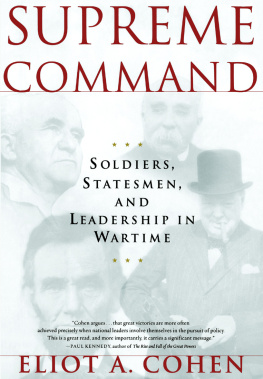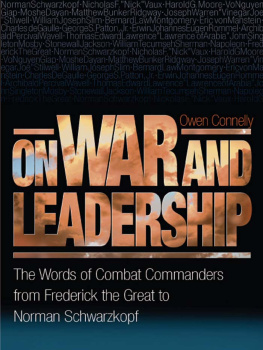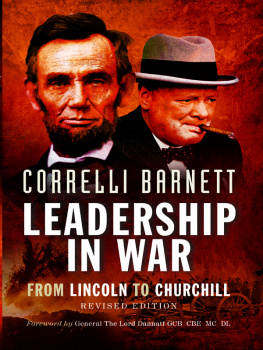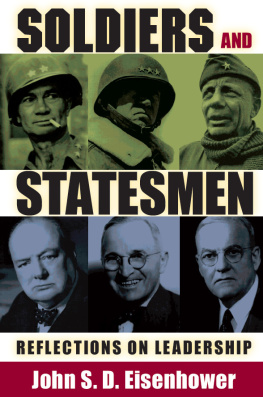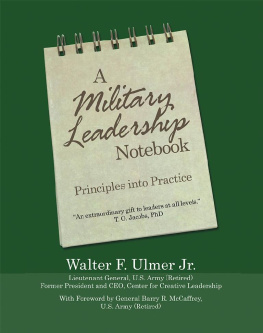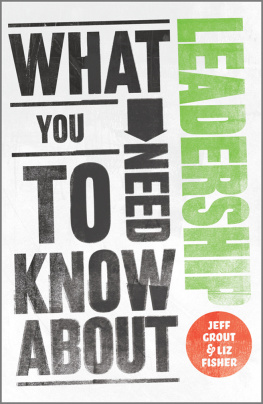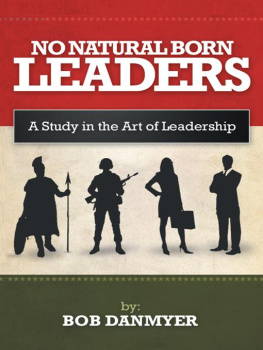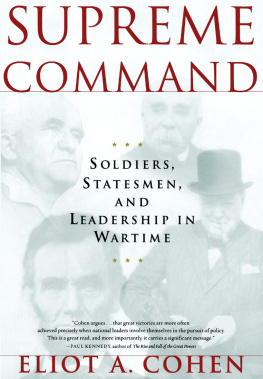
ELIOT A. COHEN is Professor of Strategic Studies at the Paul H. Nitze School of Advanced International Studies of the Johns Hopkins University. He previously served on the policy planning staff of the Office of the Secretary of Defense and as an intelligence officer in the United States Army Reserve, and taught at the U.S. Naval War College and at Harvard University. He has written books and articles on a variety of military and national security-related subjects. A frequent consultant to the Department of Defense and the intelligence community, he is a member of the Defense Policy Board, advising the Secretary of Defense. He lives in Washington, DC
Visit us online at www.SimonandSchuster.com
Jacket design by Andy Carpenter
Jacket photographs: Abraham Lincoln CORBIS; Winston Churchill
Bettmann/CORBIS; French Politician and Premiere Bettmann/
CORBIS; Ben-Gurion John Philips/TIMEPIX
Author photograph by Kaveh Sardari/Johns Hopkins University
Copyright 2002 Simon & Schuster Inc.
Distributed by Simon & Schuster Inc.
PRAISE FOR
SUPREME COMMAND
This is the most important book in a long time on military affairs. It is likely to become the standard volume on the subject of top command. It also promises to change the way we all look at how wars should be managed by presidents and other civilian leaders. Military officers especially may be shocked by Cohens conclusion that the best civilian leaders are those who meddle and ask tough questions of their military subordinates. But even those who disagree with him will come away informed by the argument.
THOMAS E. RICKS, author of Making the Corps
A commanding study of leadership in times of war. If I could ask President Bush to read one book, this would be it.
WILLIAM KRISTOL, editor, The Weekly Standard
A fascinating study of the intersection of war and politics. Cohens exploration of the conundrum of wartime leadershipWho should run things: president or general?is both brilliant and unconventional. A timely book, very readable and original.
CHARLES KRAUTHAMMER, syndicated columnist
T he relationship between military leaders and political leaders has always been a complicated one, especially in times of war. When the chips are down, who should run the showthe politicians or the generals? In Supreme Command, Eliot Cohen examines four great democratic war statesmenAbraham Lincoln, Georges Clemenceau, Winston Churchill, and David Ben-Gurionto reveal the surprising answer: the politicians. Great statesmen do not turn their wars over to their generals, and then stay out of their way. Great statesmen make better generals of their generals. They question and drive their military men, and at key times they overrule their advice. The generals may think they know how to win, but the statesmen are the ones who see the big picture.
Lincoln, Clemenceau, Churchill, and Ben-Gurion led four very different kinds of democracy, under the most difficult circumstances imaginable. They came from four very different backgroundsbackwoods lawyer, dueling French doctor, rogue aristocrat, and impoverished Jewish socialist. Yet they faced similar challenges, not least the possibility that their conduct of the war could bring about their fall from power. Each exhibited mastery of detail and fascination with technology. All four were great learners, who studied war as if it were their own profession, and in many ways mastered it as well as did their generals. All found themselves locked in conflict with military men. All four triumphed.
Military men often dismiss politicians as meddlers, doves, or naifs. Yet military men make mistakes. The art of a great leader is to push his subordinates to achieve great things. The lessons of the book apply not just to President Bush and other world leaders in the war on terrorism, but to anyone who faces extreme adversity at the head of a free organizationincluding leaders and managers throughout the corporate world.
The lessons of Supreme Command will be immediately apparent to all managers and leaders, as well as students of history.



A Division of Simon & Schuster, Inc.
1230 Avenue of the Americas
New York, N Y 10020
www.SimonandSchuster.com
Copyright 2002 by Simon & Schuster, Inc.
All rights reserved, including the right of reproduction in whole or in part in any form.
THE FREE PRESS and colophon are trademarks of Simon & Schuster, Inc.
Library of Congress Cataloging-in-Publication Data is available
ISBN 0-7432-3049-3
eISBN 978-0-7432-4222-6
Thank you for purchasing this Free Press eBook.
Sign up for our newsletter and receive special offers, access to bonus content, and info on the latest new releases and other great eBooks from Free Press and Simon & Schuster.

or visit us online to sign up at
eBookNews.SimonandSchuster.com
Alvin H. Bernstein, in memoriam
To Shakespeare, robes and crowns and jewels are the garments most appropriate to man because they are the fitting outward manifestation of his inward majesty, but to us they seem absurd because the man who bears them has, in our estimation, so pitifully shrunk. We do not write about kings because we do not believe that any man is worthy to be one and we do not write about courts because hovels seem to us to be dwellings more appropriate to the creatures who inhabit them.
Joseph Wood Krutch, The Modern Temper
CONTENTS
PREFACE
This is a book about leadership in wartimeor more precisely about the tension between two kinds of leadership, civil and military. In it I have attempted to uncover the nature of strategy-making in war by looking at four great democratic war statesmen, and examining how they dealt with the military leaders who served them. My hope in so doing is to explore some fundamental aspects of leadership. This is, therefore, not merely an historical analysis but a study of issues that remain alive to this day.
This work will appeal, I hope, to those readers who desire to know more about the four statesmen I discuss in the middle of the book and to those who are interested more generally in the problem of how men (or women) confront the greatest challenges that can befall a national leader. There will be other audiences as well, I hope: students of leadership more broadly viewed, soldiers who wish to learn more about the problems of civil-military relations in wartime, scholars interested in this field, and indeed politicians themselves.
The book begins with a discussion of the problem of civil-military relations from a general point of view. Those interested in plunging a bit more deeply into this issue should consult the appendix, The Theory of Civilian Control. The first chapter sketches out what I call the normal theory of civil-military relationsa norm violated in most ways by the subjects of the next four chapters. Lincoln, Clemenceau, Churchill, and Ben-Gurion each receive a chapter-length account, focusing on the problem of civil-military relations. These chapters do not deal with all aspects of wartime leadership (industrial mobilization, for example) except insofar as it affected civil-military relations. explores civil-military relations after World War II by looking at how the United States has waged war under far less effective leaders than those studied here. A final chapter attempts to draw more generalized lessons for contemporary democracies, and for students of leadership more broadly viewed.
Next page
